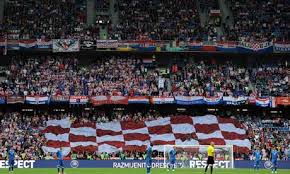By Mark Baber
April 24 – In the wake of UEFA sanctioning Croatia for the racist behaviour of same of their fans, the Croatian Football Federation turned on the Head of the Football against Racism in Europe (FARE) organiser in Croatia, falsely blaming him for the team having to play Italy behind closed doors. FARE have responded with an article on their website, which explores the issue in depth.
The open letter which the Croatian Football Federation sent to Zoran Stevanovic of the FARE network blaming him for the country being sanctioned is extraordinary, not just in its premise that the problem is not racist chanting, but the reporting of it to UEFA, and the fact it is completely misdirected. As FARE made clear in a statement, FARE sends two independent monitors to games who “are highly trained and experienced individuals who are independent and carry no affiliation to any clubs or national teams involved in the matches they observe. The observers are recruited from a pool of people outside of Fare member organisations.”
A newly published article on the FARE network site authored by Dario Brentin, a PhD-candidate at the School of Slavonic and Eastern European Studies at University College London working on the topic of sport and national identity in post-socialist Croatia, examines in detail the issue of the “Za dom spremni,” [For the Home(land) – Ready], one of the chants (along with separate homophobic chants) which landed Croatia in hot water.
Brentin examines the use of the “Za dom spremni” chant in its historical and cultural context, its intimate relationship with the racist and genocidal Ustaša regime era and points out that CFF President Davor Suker’s supposed platform of “zero tolerance” to racism and discrimination and the argument that the CFF should not be punished for “just a couple” of racist chants are incompatible.
Brentin makes the important point that football’s commitment to racism and anti-discrimination is not just a matter of trite symbolism, ineffectual slogans or dealing with an entirely marginalised ideology. Fighting racism and discrimination is not a trivial matter but, in the case of Croatia, involves opposition to “the acute problem of the open expression of xenophobia, nationalism and racism among some Croatian football fans.”
According to Brentin: “Sporting officials continue to perpetuate a narrative that identifies the issue of political extremism in sporting arenas as a problem exclusive to a small group of radicalised football hooligans. This posits that they function as a sort of agent provocateur and hence cannot be controlled. In attempting to trivialize and individualise the guilt, as well as to de-contextualize it from the wider social picture, governing sports bodies seek to minimise any responsibility on their own behalf and legitimise their hypocrisy when dealing with the issue.”
For the CFF the problem of dealing with the issue is clearly particularly strongly felt, given that Davor Suker himself has paid tribute at the grave of Ustase leader and war criminal, Ante Pavelic, in Madrid, and is therefore himself part of what sociologist Dražen Lalić characterises as a “renaissance of Fascism” in Croatian society, with (proto-) fascist discourse no longer at the margins of social life.
Whilst Brentin argues that what is really required in the larger context is an intensified education on the Holocaust, human rights and the consequences of racism, one has to hope that the CFF’s open letter pointing of the finger at FARE, which led to shouts of “traitor” and “Serb” on social media, does not lead to more serious recriminations.
Contact the writer of this story at moc.l1734962800labto1734962800ofdlr1734962800owedi1734962800sni@r1734962800ebab.1734962800kram1734962800

